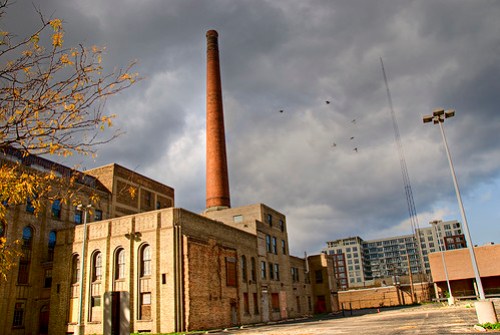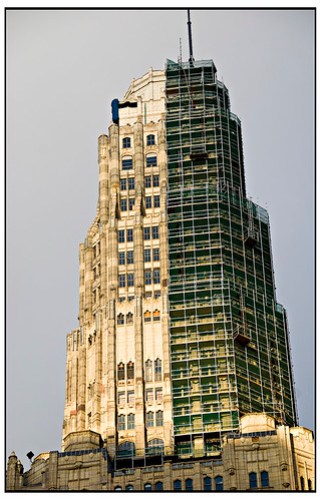
The Written Word A Lie
Whenever I hear a bloviator utter the phrase, “Chicago-style politics”, I stop listening to what they are trying to say. Richard J Daley died in 1976, and so did his “style” of politics. Richard M Daley’s style did not depend upon the same ruthlessness, nor does Barack Obama demonstrate any of the same traits. Seriously, read a book about him, like “Boss” or something by Mike Royko.
Not that facts get in the way of political campaigns…
With Chicagoan Barack Obama in the White House and his hometown famed for cutthroat politics, it was perhaps inevitable that rivals would seize on guilt by geography to try to discredit him.
The city’s latest star turn as villain to Republicans began in recent days as Mitt Romney, Obama’s all-but-certain challenger in November, fumed while Democrats intensified attacks on his finances, tax returns and record as a private equity manager.
“Chicago-style politics at its worst,” the former Massachusetts governor and Bain Capital founder declared in a refrain quickly picked up by his campaign surrogates.
Ed Gillespie, a former Republican National Committee chairman, accused the Obama campaign of using “classic Chicago-style politics” to try to splatter mud over Romney’s credentials.
To Rove, the attacks on Romney were “gutter politics of the worst Chicago sort.”
Former New Hampshire Gov. John H. Sununu took it further: “Can you imagine coming out of Chicago politics, where ‘politician’ and ‘felon’ are synonymous? You’ve got two governors in prison today,” he told CNBC, conflating the misdeeds of Chicago Democrat Rod R. Blagojevich with those of downstate Republican George Ryan.
…
Dennis Goldford, an expert on presidential politics at Drake University in Des Moines, said the Republican imagery was an attempt to insinuate that Obama is a disciple of a throwback big-city political organization built on muscle and seediness.
“It strikes me as odd, because Obama was really not part of that old-style Chicago machine,” Goldford said, adding that the strategy seems geared toward swaying older voters who remember lore about the Richard J. Daley era in Chicago.
“But for college students, history is yesterday,” he said.
Politically, there’s less risk for Republicans in ripping Chicago than virtually anywhere else in the country. The city votes reliably Democratic, and Chicagoans have been known to take a perverse pride in their city’s tough-guy political reputation.
Even Obama has played it up in the past. During his 2008 run for president, he quoted from the movie “The Untouchables,” in which Sean Connery describes the “Chicago Way”: “He pulls a knife, you pull a gun.”
And without question, Chicago has seen a goodly share of high- and low-profile officials and operatives shipped off to prison over the decades, and Republicans would like to prod voters into thinking that some of that dirt surely must have rubbed off on Obama.
But political wrongdoing knows few geographic bounds. On a per-capita basis, North Dakota endured more than twice as many federal corruption convictions as Illinois over the last decade, according to Justice Department data. And politicians don’t complain about North Dakota-style corruption.
Chicago may be in the cross hairs of conservative political stereotyping because of Obama, but the city has company.
San Francisco, home of House Democratic leader Nancy Pelosi and a hotbed of liberal causes, is often referred to in sneering tones on the campaign trail. Boston and its environs get picked on as a nest of effete intellectuals, even by Romney — who holds two Harvard degrees, served as Massachusetts governor and maintains his official voting address there. The spin is that if Romney can govern successfully in Massachusetts, he can do so anywhere.
Still, bashing Chicago has developed into something of a reflex among partisan finger-pointers. Some hail from parts of the country with less than pristine political reputations themselves.
In Louisiana, a City Council candidate from suburban New Orleans in March accused a rival of stealing a political consultant, and said that such “Chicago-style tactics will backfire,” according to media reports.
(click here to continue reading On campaign trail, Chicago’s a popular villain – latimes.com.)

Blago Jogging on May Street
We’ve discussed which state is the most corrupt, and by most measures, Illinois isn’t even in the top ten, despite what is frequently shouted on television. And yes, even though Illinois has had several governors sent to prison, Illinois still isn’t the worst.
For instance:
The stories go on and on. Open records laws with hundreds of exemptions. Crucial budgeting decisions made behind closed doors by a handful of power brokers. “Citizen” lawmakers voting on bills that would benefit them directly. Scores of legislators turning into lobbyists seemingly overnight. Disclosure laws without much disclosure. Ethics panels that haven’t met in years.
State officials make lofty promises when it comes to ethics in government. They tout the transparency of legislative processes, accessibility of records, and the openness of public meetings. But these efforts often fall short of providing any real transparency or legitimate hope of rooting out corruption.
That’s the depressing bottom line that emerges from the State Integrity Investigation, a first-of-its-kind, data-driven assessment of transparency, accountability and anti-corruption mechanisms in all 50 states. Not a single state — not one — earned an A grade from the months-long probe. Only five states earned a B grade: New Jersey, Connecticut, Washington, California, and Nebraska. Nineteen states got C’s and 18 received D’s. Eight states earned failing grades of 59 or below from the project, which is a collaboration of the Center for Public Integrity, Global Integrity, and Public Radio International.
The F’s went to Michigan, North Dakota, South Carolina, Maine, Virginia, Wyoming, South Dakota, and Georgia.
(click here to continue reading State Integrity Investigation overview: 50 states and no winners – State Integrity Investigation.)
Footnotes:

























